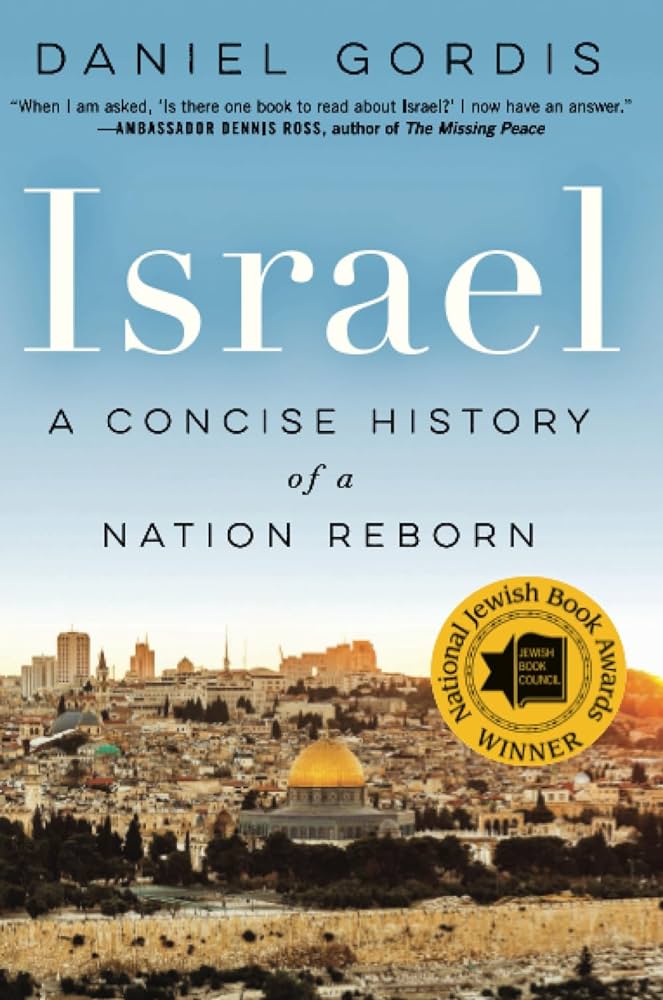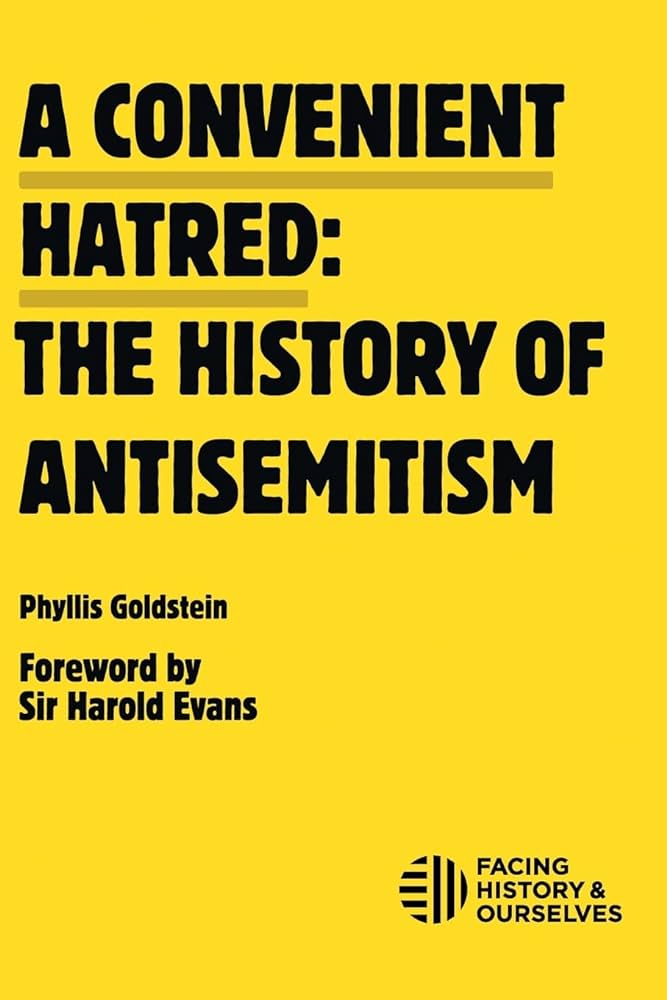Judaism, Zionism, and Antisemitism
I am creating this page in October 2023. It is one week since Hamas perpetrated an unspeakable terrorist attack on Israeli civilians, the majority of them Jewish. I have watched many across the world fail to condone this act and in fact declare it justifiable and deserved - this is antisemitism. It is slightly over two years since May 2021, when I started paying attention to the "Free Palestine" protests and started questioning my identity as a Jewish person and my connection to Israel.
Over the past two years I have started asking more questions of my identity, questioning what I learned in Hebrew school as a child and what I heard in synagogue growing up. Some of it was right, some wrong, and much was not even discussed. I decided to add a page to share the books I have found helpful in understanding my Jewish identity, my connection with Israel, and understanding antisemitism, "the oldest hatred in the world." Whether or not you are Jewish, I hope you find these suggestions helpful.
Judaism

What is a Jew?, by Rabbis Morris Kertzer and Lawrence Hoffman
I actually read this book years ago on my plane to Israel, but I highly recommend it as an approachable overview to understanding Jewish traditions and beliefs. It can be a good place for Jewish people to start in order to reconnect with their religion and culture, and a great place for non-Jews to start to understand the terms and definitions, and the background to the different holidays and traditions.

Jewish Literacy, Joseph Telushkin
This encyclopedic volume is amazing as both a read and a reference. It provides details on Jewish history from the start of the Torah to the present, nuances of Jewish tradition, and an honest evaluation of many Jewish controversies. I wish I had read this book years ago, makes me feel much more connected with my Jewish identity.
Israel and Zionism

Israel: A Concise History of a Nation Reborn, Daniel Gordis
I think this book is the best overall history book in terms of approachability and writing (Tishby's is very basic, Morris's is very dense). I don't think Gordis really pulls any punches, giving an honest and critical look at Israel's creation and evolution. He points out the highs and lows, reveals that the way we see Israel in the media and public opinion is not the way it has always been. The book was so well-written, I had a hard time putting it down (I think I finished it in a week). I wouldn't say this book leaves you with more questions than answers, but it opens up a world of further reading on the events, the people, and other more specific topics - each chapter could be a textbook on its own.
Update August 2025: I recently read "Impossible Takes Longer" also by Gordis, which discusses many of the same ideas as in this book but also provides updated context from the October 7th attacks and is also a great read.

Israel, Noa Tishby
This book is an excellent overview of Israel and a great starting place to understanding Zionism (for those with minimal background). Tishby is a very conversational writer and it takes a little getting used to but ultimately it helps welcome you into the history and background of how Israel came to be. Not only does it help you understand Israel, but it also helps you understand its relationship with Palestinians and other neighboring countries. This book is a perfect example of how you can be a Zionist and still be critical of the government's policies. I highly recommend starting here, as this book fulfills its goal as "a simple guide" before delving into more complex topics.

We Stand Divided, Daniel Gordis
This is an excellent book for American Jews and helped me better understand my identity. American Jews have long had a complex relationship with Israel, for which they try to show support but sometimes wish would be less controversial. Gordis does an excellent job providing a view from both sides, helping to bridge the gap between the cultures. As he points out, I realized how little I truly understood about my Jewish identity, how much I have been missing out on Jewish traditions and culture, a problem I have been trying to solve since reading this book in 2022.

Righteous Victims, Benny Morris
This book is an extremely detailed history of the Israeli/Arab conflict up to 2000. The book itself is very thick and innundated with minute details and it can be easy to get bogged down, but it was also a very important read to help me contextualize the history of the region. Morris freely acknowledges his biases but does his best to be critical of all sides of the conflict. One of the most important parts of the book was not the description of the wars, but the events that lead to each specific war. The book is mainly intended to discuss the conflicts and those involved, so some of the political nuances are glossed over - those details are for a different book. I would highly recommend this book for anyone willing to take the time to understand the history of the conflict.

My Promised Land, Ari Shavit
The most painful and conflicting Zionist perspective I have read, Shavit explores the nuances of Israel from a number of perspectives. He does not sugarcoat or whitewash anything, drawing on his own personal experiences as a reporter and former IDF member to bring to light the darker side of Israel's history. A tough but honest read.
Antisemitism

Jews Don't Count, David Baddiel
More of a long essay than a book, this book discusses why antisemitism seems to be singled out by leftists and progressives as not as important as other biases. Baddiel points out that while most hatreds consider the group in question inferior, antisemitism is unique in that it considers Jews simultaneously superior and inferior, thereby making them acceptable for "punching up." By pointing it out, the hope is to make progressives more aware of their own internalized antisemitism.

How to Fight Anti-Semitism, Bari Weiss
A very short book but I think it makes an extremely important distinction between left-wing and right-wing antisemitism. Whereas right-wing antisemitism is blatantly hateful and violent (think Nazis), left-wing antisemitism is more insidious, rife with gaslighting and forced assimilation, which is just as dangerous. Weiss also discusses the rise of "Islamism," which needs to be differentiated from the religion of Islam and does not follow the right/left dichotomy. It's a very helpful book to understand current political views and opinions and how Jews feel caught in the middle.

A Convenient Hatred, Phyllis Goldstein
Any book that takes on the momentous task of telling "the whole story" has a high bar, but I found this book to be an excellent introduction and teach me many bits of history I wasn't aware of. It was saddening but fascinating to watch the evolution of antisemitism, as Jewish people went from being one group of many in ancient times to an ostracized and villified population, often for contradictory reasons. It was heartbreaking to read the same story play out over and over again, time period after time period. Of course I found the contemporary post-WWII history the most relevant, and I think it is extremely important how the Soviet Union turned the tide from antisemitism to antiZionism. An excellent starting point for anyone who wants to gain a stronger historical perspective.
Jewish History

Genius and Anxiety, Norman Lebrecht
A fascinating book about the world-changing Jews from 1847 to 1947. I loved Lebrecht's writing which was fast-paced and kept you on edge while telling each person's story. The book mentions a spectrum of Jews, those famous and those less so, and many who may not have a well-known connection to Judaism. I felt his writing reflect the title, as the reader's anxiety grows knowing what tragic events lie around the corner as the book grows ever closer to the Nazi era. The book was fascinating and it made me want to read a separate biography about each historic figure.